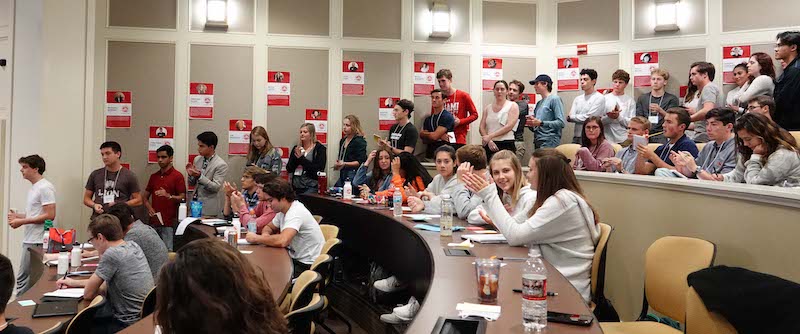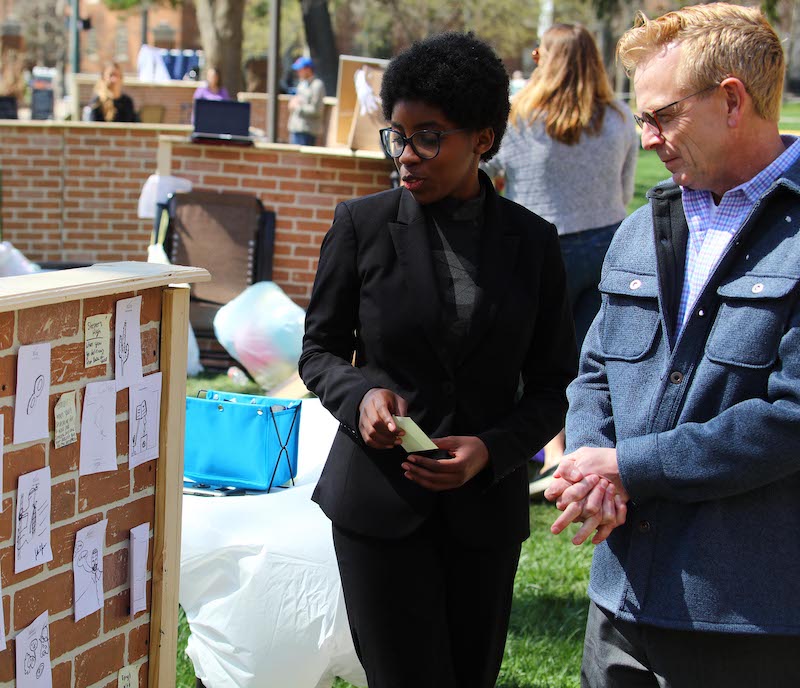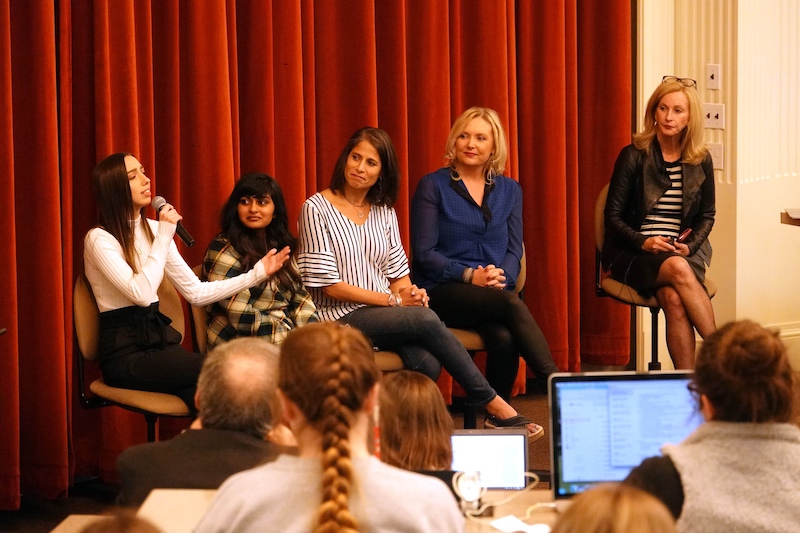

Miami’s Institute for Entrepreneurship 5th among U.S. public universities

A student explains her Creativity City project to Tim Greenlee, Farmer School professor and senior associate dean.
Written by Addie Rosenthal, senior director of communications, Farmer School of Business
The John W. Altman Institute for Entrepreneurship at Miami University is ranked 5th among public undergraduate colleges and universities in the 2020 Princeton Review and Entrepreneur magazine rankings.This marks the 12th consecutive year that the institute in Miami’s Farmer School of Business has been ranked in the top 10 among public U.S. undergraduate programs, and the first time it has appeared in the top five. Among public and private U.S. universities combined, Miami’s program is ranked 10th best.*
“Central to the design of Miami University’s undergraduate entrepreneurship program is a belief in the transformative power of learning by doing inside and outside the classroom. What sets our program apart from others is our commitment to graduate students who are ‘job-ready, day one,’” said Tim Holcomb, institute director.
The Altman Institute for Entrepreneurship has a cross-disciplinary focus that engages 2,800 students — more than 15 percent of the total undergraduate population — from every major across campus. The students learn from:
- Startup ecosystem partnerships that connected more than 400 business and entrepreneurship professionals with Miami students.
- Curricular and co-curricular programs that integrate effectively with the entrepreneurial ecosystem.
- Numerous opportunities to gain practical, hands-on experience, including with programs such as:
- Techstars® Startup Weekend Miami
- Social Innovation Weekend
- World Creativity and Innovation Week
- Advancing Women in Entrepreneurship
- RedHawk Venture Pitch Competition
- The Altman Summer Scholar Internship Program
- Two student-led investment funds, RedHawk Ventures and the Social Impact Fund.
“The diverse, talented faculty at Miami have crafted the right formula of academic and experiential learning to produce world-class students,” said CincyTech CEO Mike Venerable. “It's important for our success to have this asset in the Cincinnati region.”
More than 1,000 students benefit each year from 19 co-curricular programs that are practice-based and immersive in design.
“Creativity and problem-solving will be required for success in tomorrow’s innovative business climate,” said Greg Carmichael, chairman, president and CEO of Fifth Third Bank. “I’m excited about the success that Miami’s entrepreneurship program is experiencing in preparing students for this changing world.”
Techstars Board Director Wendy Lea (far right) leads a panel consisting of female entrepreneurs at the Farmer School of Business.
Miami graduates find success in venture-backed companies
Over the past decade, more than 600 Miami graduates have led 112 venture-backed companies that have raised $6.1 billion in funding in 237 venture deals, including seven ‘unicorn’ companies with $1 billion+ market valuations, said Holcomb.
“Entrepreneurship requires the courage to face uncertainty, the humility to accept that failure may provide a pathway to success, and the determination to bring an idea to reality. Courage, humility and determination are difficult to teach in a classroom setting,” Wendy Lea, board director at Techstars® and former CEO at Cintrifuse, explained. “Miami’s immersive, practice-based learning approach to entrepreneurial education inside and outside the classroom equips students with the mindset to think creatively and the capacity to act in ways that bring ideas to reality.”
“Universities play an important role in preparing tomorrow’s entrepreneurial workforce to be innovative problem-solvers, and I’m proud to see Miami’s entrepreneurship program recognized for its efforts to train young entrepreneurs to think creatively and nurture an entrepreneurial mindset,” said Nichole Mustard (Miami ’95), chief revenue officer and co-founder of Credit Karma.
"With innovation driving changes in education and industry, it's significant that students in every major at Miami have access to the entrepreneurial experience,” said Gregory Crawford, Miami’s president. “Their exposure to the creative thinking behind entrepreneurs and inventors is invaluable and ultimately contributes to the creative economy of Ohio and the nation."
The Princeton Review collected more than 40 data points from a survey earlier this year. The survey asked schools to report on levels of their commitment to entrepreneurship studies inside and outside the classroom. Topics included the percentage of faculty, students, alumni actively and successfully involved in entrepreneurial endeavors, the number and reach of mentorship programs, scholarships and grants for entrepreneurial studies, and the level of support for school-sponsored business plan competitions.
“The impact of Miami’s entrepreneurship program on its students and graduates is made possible by world-class faculty and staff who have an unwavering commitment to high-quality research and pedagogy that prepares graduates to meet the demands of the 21st century, combined with tremendous support from our engaged alumni and industry partners,” added Marc Rubin, dean and Mitchell P. Rales Chair in Business Leadership of the Farmer School of Business.
* A school in Mexico is among the top 11 on the list.
